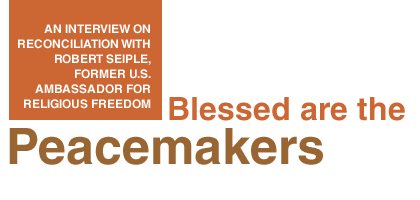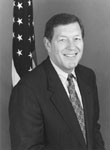Interview by
Connie McDougall![]()
"I think reconciliation is
the compelling image
and exercise of the
21st century."
Robert Sieple
Seattle Pacific University is hosting a total of three Church Leaders Forums
this year, each addressing an aspect of the theme,
"Leading the World on the Road of Reconciliation."
February 8,
2001. "Reconciliation of Ethical Dilemmas," presented by
Richard Hays, professor of New Testament at Duke University Divinity
School. Known for his work in the fields of Pauline theology and New
Testament ethics, Hays is the 2001 Palmer Lecturer and the keynote
speaker for SPU's Church Leaders Day.
May 3,
2001. 'Reconciliation in
Our Personal Lives," presented by Gordon MacDonald, author of 10 books
including the highly acclaimed Ordering Your Private World. In 1998,
MacDonald and Tony Campolo provided spiritual guidance to Bill Clinton at
the President's request.
For more information about the Church Leaders Forums,![]()
SPU Church Leaders
Forums Focus on
Reconciliation
Still to come are:
call 206/281-2100.

 One of three keynote speakers for this year's Church Leaders Forums at
Seattle Pacific University, Robert Seiple is a leader in the area
of international reconciliation. The first U.S. ambassador-at-large for
international religious freedom, he was charged with championing religious
freedom worldwide
and helping to bring about reconciliation in areas where religious conflict
exists. He recently left his government post to begin a new
organization promoting religious freedom and reconciliation, The Institute
for Global Engagement.
On November 7, Seiple spoke to a campus-wide audience at a Community Chapel
service titled "Blessed are the Peacemakers," and addressed church leaders
at a forum titled
"Leading the World on the Road to Reconciliation." In the first installment
of a three-part interview series on the topic of reconciliation,
Response recently spoke with Seiple.
One of three keynote speakers for this year's Church Leaders Forums at
Seattle Pacific University, Robert Seiple is a leader in the area
of international reconciliation. The first U.S. ambassador-at-large for
international religious freedom, he was charged with championing religious
freedom worldwide
and helping to bring about reconciliation in areas where religious conflict
exists. He recently left his government post to begin a new
organization promoting religious freedom and reconciliation, The Institute
for Global Engagement.
On November 7, Seiple spoke to a campus-wide audience at a Community Chapel
service titled "Blessed are the Peacemakers," and addressed church leaders
at a forum titled
"Leading the World on the Road to Reconciliation." In the first installment
of a three-part interview series on the topic of reconciliation,
Response recently spoke with Seiple.
Response: You've just left your position with the U.S. government to
begin your own organization, the Institute for Global Engagement. What
exactly is that?
Seiple: I call it a think tank with legs. The primary goal is to
promote religious freedom, with two major thrusts: 1) finding and developing
emerging leaders who will promote religious freedom and reconciliation, and
2) creating sustainable environments of religious freedom worldwide. This
includes teaching, research and field work. That's why we call it a "think
and do tank."
Response: How did your previous position as the U.S.
ambassador-at-large for international religious freedom influence the
creation of the Institute?
Seiple: As ambassador, I was able to see what was being done and what
was not being done in the area of religious freedom. Nobody is looking at
the root causes of religious persecution or at sustainable solutions. There
are a lot of good and well-intentioned people in and out of the church
applying band- aids to the symptoms, but we want to find solutions that
endure. That's why my wife, Margaret Ann, and I began the Institute.
We need more sophisticated interlocutors of faith who understand the
geopolitical contexts and can work with the local government as well as the
village. We have to do that or lose our relevance. In terms of the
Institute's vision, we want to make Christ visible, and Christianity
relevant, in the cruel edges of the world.
Response: "Cruel edges of the world" … that's eloquent.
Seiple: I think so too. It's from Eugene Peterson's The
Message, Hebrews, Chapter 11.
Response: How do you define reconciliation?
Seiple: There's a verse in the Bible that defines the major
components of reconciliation: Psalm 85:10. It says reconciliation is when
"truth and mercy embrace" and
"justice and peace kiss." Those are the four components that have to go
together for reconciliation. Two look backward and two look forward to a
preferred future.
Response: Are there some situations in the world, such as the
problems in the Middle East, that are beyond reconciliation?
Seiple: A lot of places, when viewed through secular lenses, seem
intractable. But as Christians, we believe that with our God nothing is
impossible. There are problems on both sides in the Middle East, but there
is no sustainable solution there or anywhere else without reconciliation,
without a process of truth-telling, mercy, peace and justice.
I think reconciliation is the compelling image and exercise of the
21st century. If we don't find out how to do it, we as Christians will be
irrelevant — which is a tragedy considering that it is the essence of
the gospel. The Word becomes flesh and dwells within us. That's what it's
all about. The methodology is reconciliation and it took Christ from
Gethsemane to Calvary. It's painful, but it's the best model we have.
Response: The topic of your Community
Chapel at SPU was "Blessed are the Peacemakers." What was the focus of your
presentation?
Seiple: I told the stories of people who became peacemakers and what
sacrificial work that is. Certainly the only child of God had a rough time.
He started as a refugee, was marginalized most of his life, ran afoul of the
religious authorities and ended up on a cross. Peacemakers have tough work.
Reconciliation isn't for sissies.
Response: Did you have a challenge for those who attended the Church
Leaders Forum?
Seiple: I asked them how they and their congregations could get
involved in these issues < because reconciliation is the core of the gospel.
The challenge is that if you don't have a methodology of reconciliation,
then nothing you do will fix things permanently. This is why people leave
the churches. They see only superficial solutions.
Response: Your focus on reconciliation is especially believable
because of your own past. As a bombardier you flew 300 combat missions in
Vietnam, yet you were among the first to push for reconciliation with
Vietnam.
Seiple: I had to do it. As Christians, we're commanded to "not let
the sun go down upon your wrath." The war was over 24 years ago, but there's
more repair to be done. An unreconciled conflict undermines the victim and,
in Vietnam, everyone was a victim. Everyone who suffered or died is
trivialized by a war that has no closure.
Response: As part of its vision to "engage the culture and change the
world," how can SPU contribute to the process of reconciliation?
Seiple: Teach people about it. This is an impressionable age group.
Teach them and ask them, "What values are you bringing to the problem that
will stick?" SPU can establish credible hope in its students, and offer
reconciliation models that can be explored and acted upon.
At the end of the day, the core competency for the Christian is to
bear witness to the hope that lies within us. And for hope to be credible in
the future it has to be credible in the present. SPU has to help us do that.
 In the Bosnian town of Gornji Vakuf, Robert Seiple examines
a spent rocket and a child's boot found in a building devastated
by war. The former president of World Vision (US), Seiple visited
war-torn Bosnia in November 1995. Photo by Bruce Brander/World Vision.
In the Bosnian town of Gornji Vakuf, Robert Seiple examines
a spent rocket and a child's boot found in a building devastated
by war. The former president of World Vision (US), Seiple visited
war-torn Bosnia in November 1995. Photo by Bruce Brander/World Vision.
![]()

| Please
read our
disclaimer.
Send any questions, comments or correspondence about Response to
jgilnett@spu.edu or call 206-281-2051. Copyright © 2000 University Communications, Seattle Pacific University.
Seattle Pacific University |